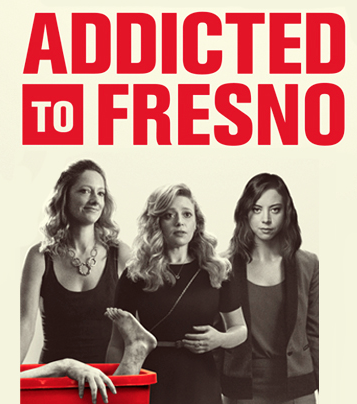To most people, even those living in it, Fresno is no more than a truck stop along the way to somewhere better. Jamie Babbit, best known for directing the cult classic But I’m A Cheerleader, teams up with muse Natasha Lyonne again to elucidate just how much of a sinking hole the town is, yet somehow manages to ensnare its residents for life, hence being Addicted to Fresno.

Centered on the contentious relationship between two sisters, Shannon (Judy Greer) and Martha (Natasha Lyonne), the film begins at the end with Shannon walking into a correctional facility (in the wake of Orange Is the New Black, Lyonne always brings on the prison tableau now) and explaining, “They say having a sister is like having a best friend you can’t get rid of. You know, whatever you do, they’ll still be there. Well that was never our story. Our story is about how sisters can sink each other–really sink each other.” Karey Dornetto’s script then cuts to two years earlier, when all the trouble began, or rather, continued thanks to Shannon’s re-entrance into Martha’s life after getting fired from a pompous school in Carmel-by-the-Sea for letting her sex addiction get the better of her and sleeping with everyone on the faculty.

Feeling obligated to help her even though she’s supposed to be the big sister, Martha gets Shannon a job as a maid at the Fresno Suites, where she works as well. Martha’s ho-hum existence doesn’t seem to bother her nearly as much as it does Shannon, who is fiending for a sex fix every minute, and is, in fact, having an affair with her therapist, Edwin (Ron Livingston). When Edwin actually leaves his wife for her, however, it makes Shannon uncomfortable enough to sleep with the gross guy, Boris (Jon Daly, sporting an accordingly gross hairstyle), at the hotel who always brings prostitutes there. But since Martha isn’t supposed to know that the rehab for her sex addiction is far from working, Shannon pretends Boris is raping her and uses it as an excuse to beat the shit out of him a little too effectively, resulting in his death and the imminent need for Martha and Shannon to cover it up.

Their ill-advised decision to go to Gerald (Fred Armisen), a cremator at a pet cemetery that Shannon once boned, leads their secret to be discovered when Gerald’s girlfriend, Ruby (Allison Tolman), removes the blanket covering Boris so she can measure what they’re calling their Great Dane. Allured by the potential for blackmail, Ruby tells them they have to come up with $25,000 so that she and Gerald can escape Fresno for a slightly better shithole, Detroit. Telling of the financial options in the town, Shannon insists the only way to make fast money is through drugs or prostitution. Instead, they rob a sex shop, finding that it has a surplus of dildos, rather than money, to offer. They later sell the rubbery orgasm givers to those in attendance at a lesbian softball player convention happening at the hotel.
This is one of many hijinks indicative not only of the desperation that a place like Fresno can invoke, but the sheer depravity it can cause in large part due to boredom and contempt for the rest of the population living there. The vortex vibes of the town are encapsulated by Martha asking Shannon, “If you hate Fresno so much, why’d you come back?” Shannon replies, “Obviously because of I’ve made a series of poor life decisions.” But more than that, all those Central and Northern California towns tend to pull their original residents back in, reminding them that city folk belong in the city and Central Californians belong in, well, a pit.

Apart from the succinct portrait of life in a Californian town that’s not L.A. or San Francisco, Addicted to Fresno offers us Aubrey Plaza as a lesbian with gumption, a rapping 13-year-old whose bar mitzvah is integral to the plot and a more realistic depiction of what a sisterly relationship is like–a.k.a. it’s more akin to Baby Jane and Blanche Hudson than Andrews Sisters vibes. This can be summed up by one of Shannon’s final lines, “P.S. I hate you, which in case you forgot means I love you like a sister.”






















